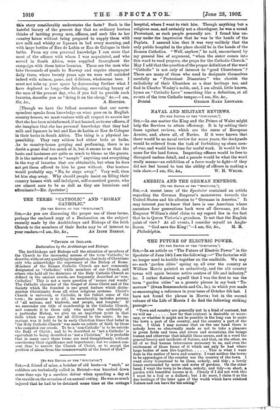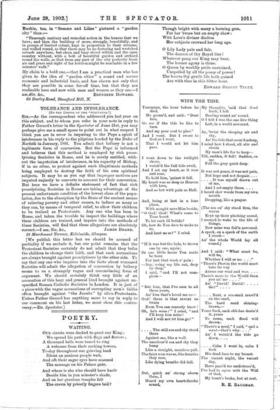THE FUTURE OF ELECTRIC POWER.
[TO THE EDITOR OF THE "SPECTATOR.")
Sin,—In an article on " The Future of Electric Power" in, the Spectator of June 14th I see the following :—" The factories will no longer need to huddle together on the coalfields. We may see such garden cities' spring up all over the country as William Morris painted so seductively, and the old country towns will again become active centres of life and industry," &c. I rather flattered myself that I was the first to use the term " garden cities " as a generic phrase in my book " To- morrow " (Swan Sonnenschein and Co., is.), to which you made so encouraging a reference in your issue of October 5th last. I have not found the phrase in Morris ; but in the second
volume of the Life of Morris I do find the following striking passage :— "Town and country are generally put in a kind of contrast, but
we will see how far that contrast is desirable or neces- sary, or whether it might not be possible in the long run to make the town a part of the country, and the country a part of the town. I think I may assume that on the one band there is nobody here so abnormally made as not to take a pleasure in green fields and trees and rivers and mountains, the beings human and otherwise that inhabit those scenes, and in a word the general beauty and incidents of Nature, and that, on the other, we all of us find human intercourse necessary to us, and even the excitement of those forms of it which can only be had where large bodies of men live together This is what I want done in the matter of town and country. I want neither the towns to be appendages of the country nor the country of the town. I want every homestead to be clean, orderly, and tidy ; a lovely house surrounded by acres and acres of gardens. On the other hand, I want the town to be clean, orderly, and tidy—in short, a garden with beautiful houses in it. Clearly if I did not wish this I must be a fool or a dullard ; but I do more, I claim it as the due heritage of the later ages of the world which have subdued Nature and can have for the asking."
!Luskin, too, in " Sesame and Lilies " pictured a " garden city" thus :—
"Thorough sanitary and remedial action in the houses that we have; and then the blinding of more, strongly, beautifully, and in groups of limited extent, kept in proportion to their streams, and walled round, so that there may be no festering and wretched suburb anywhere, but clean and busy street within and the open country without, with a belt of beautiful garden and orchard round the walls, so that from any part of the city perfectly fresh air and grass and sight of far horizon might be reachable in a few minutes walk."
My claim is a bold one,—that I am a practical man who has given to the idea of " garden cities" a sound and secure economic and industrial basis, and has shown not only that they are possible in some far-off time, but that they are realisable here and now with men and women as they are.—I am,flir, &o., EBENEZER HOWARD.
60 Durley Road, Stamford Hill, N.



















































 Previous page
Previous page